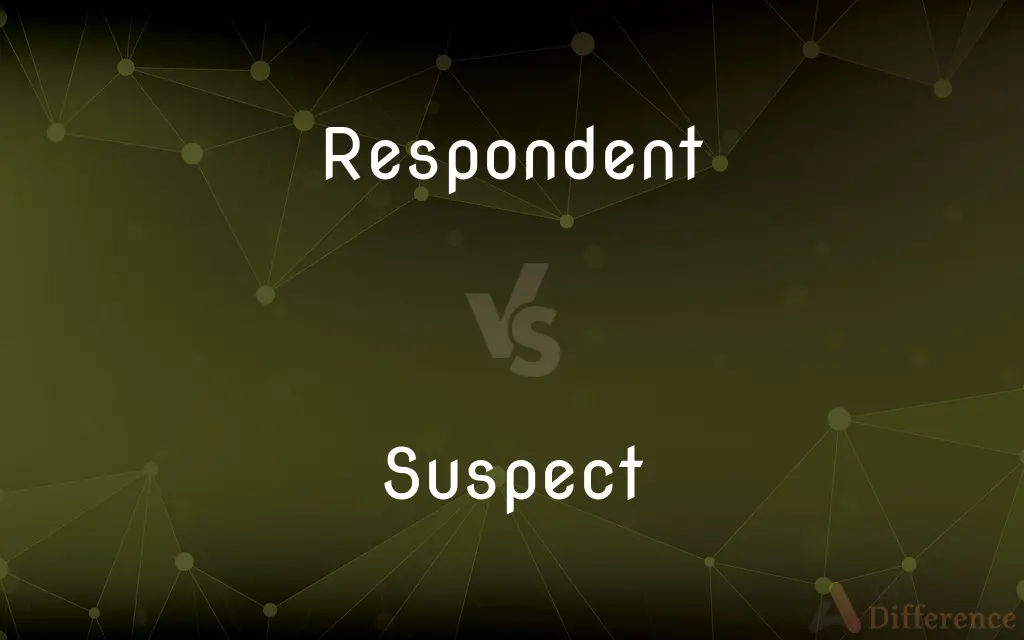Respondent vs. Suspect — What's the Difference?

Difference Between Respondent and Suspect
ADVERTISEMENT
Compare with Definitions
Respondent
A respondent is a person who is called upon to issue a response to a communication made by another. The term is used in legal contexts, in survey methodology, and in psychological conditioning.
Suspect
In law enforcement jargon, a suspect is a known person accused or suspected of committing a crime. Police and reporters in the United States often use the word suspect as a jargon when referring to the perpetrator of the offense (perp in dated US slang).
Respondent
A party against whom a petition is filed, especially one in an appeal or a divorce case.
Suspect
To consider (something) to be true or probable on little or no evidence
I suspect they are very disappointed.
Respondent
A person who replies to something, especially one supplying information for a questionnaire or responding to an advertisement
Most respondents to our questionnaire considered their practices to be in accordance with current medical guidelines
ADVERTISEMENT
Suspect
To have doubts about (something); distrust
I suspect his motives.
Respondent
In the position of a party defending against a petition
The respondent defendant
Suspect
To consider (a person) guilty without proof
The police suspect her of murder.
Respondent
Replying to something
The respondent firms in the survey
Suspect
To have suspicion.
Respondent
Involving or denoting a response, especially a conditioned reflex, to a specific stimulus.
Suspect
One who is suspected, especially of having committed a crime.
Respondent
One who responds.
Suspect
Open to or viewed with suspicion
A suspect policy.
Suspect motives.
Respondent
(Law) The defending party in certain legal proceedings, as in a case brought by petition.
Suspect
(transitive) To imagine or suppose (something) to be true, or to exist, without proof.
To suspect the presence of disease
Respondent
Giving or given as an answer; responsive.
Suspect
(transitive) To distrust or have doubts about (something or someone).
To suspect the truth of a story
Respondent
(Law) Of or being a respondent in a proceeding.
Suspect
(transitive) To believe (someone) to be guilty.
I suspect him of being the thief.
Respondent
One who responds; one who replies.
Suspect
(intransitive) To have suspicion.
Respondent
(law) A defendant, especially in a case instituted by a petition or in appellate and divorce proceedings.
Suspect
To look up to; to respect.
Respondent
A person replying to a questionnaire.
Suspect
A person who is suspected of something, in particular of committing a crime.
Respondent
Disposed or expected to respond; answering; according; corresponding.
Suspect
Viewed with suspicion; suspected.
Respondent
Disposed or expected to respond; answering; according; corresponding.
Wealth respondent to payment and contributions.
Suspect
(nonstandard) Viewing with suspicion; suspecting.
Respondent
One who responds. It corresponds in general to defendant.
Suspect
Suspicious; inspiring distrust.
Suspect [was] his face, suspect his word also.
Respondent
The codefendant (especially in a divorce proceeding) who is accused of adultery with the corespondent
Suspect
Suspected; distrusted.
What I can do or offer is suspect.
Respondent
Someone who responds
Suspect
Suspicion.
So with suspect, with fear and grief, dismayed.
Respondent
Replying;
An answering glance
An answering smile
Suspect
One who, or that which, is suspected; an object of suspicion; - formerly applied to persons and things; now, only to persons suspected of crime.
Suspect
To imagine to exist; to have a slight or vague opinion of the existence of, without proof, and often upon weak evidence or no evidence; to mistrust; to surmise; - commonly used regarding something unfavorable, hurtful, or wrong; as, to suspect the presence of disease.
Nothing makes a man suspect much, more than to know little; and therefore men should remedy suspicion by procuring to know more.
From her hand I could suspect no ill.
Suspect
To imagine to be guilty, upon slight evidence, or without proof; as, to suspect one of equivocation.
Suspect
To hold to be uncertain; to doubt; to mistrust; to distruct; as, to suspect the truth of a story.
Suspect
To look up to; to respect.
Suspect
To imagine guilt; to have a suspicion or suspicions; to be suspicious.
If I suspect without cause, why then make sport at me.
Suspect
Someone who is under suspicion
Suspect
A person or institution against whom an action is brought in a court of law; the person being sued or accused
Suspect
Imagine to be the case or true or probable;
I suspect he is a fugitive
I surmised that the butler did it
Suspect
Regard as untrustworthy; regard with suspicion; have no faith or confidence in
Suspect
Hold in suspicion; believe to be guilty;
The U.S. suspected Bin Laden as the mastermind behind the terrorist attacks
Suspect
Not as expected;
There was something fishy about the accident
Up to some funny business
Some definitely queer goings-on
A shady deal
Her motives were suspect
Suspicious behavior
Share Your Discovery

Previous Comparison
Unmannered vs. Mannerless
Next Comparison
Express vs. Describe













































